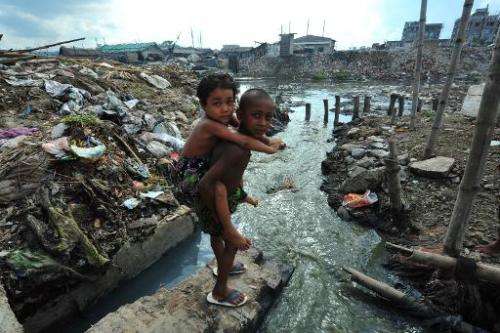Bangladeshi children prepare to cross a polluted stream near a tannery in the Hazaribagh district of Dhaka, on October 6, 2012
Bangladesh is to unveil a new "green tax" Thursday that will force polluting factories to pay extra levies as it looks to clean up the country's increasingly dirty rivers and air, an official said Thursday.
The tax will be introduced as part of the annual budget for 2014-15, which will also see a focus on giant new infrastructure projects such as a metro in the cramped capital Dhaka and a new nuclear power plant.
Under the environment tax plan, factories that have not installed waste treatment facilities or which flout the country's environment laws would be targeted, said Shamsul Alam, a senior government economics official.
"Details of how the green tax will work will be outlined in the budget speech of the finance minister," he told AFP.
Currently factories face one-off fines for polluting rivers or the air, but the penalties have proved to be inadequate and ineffective to deal with increasing number of cases.
The new tax would mostly affect the powerful textile and leather processing industries that pour often untreated effluent laced with chemicals and metals used to dye and treat cloth and animal hides.
There are some 200 hide-processing factories based in the Hazaribagh district of Dhaka, but none of them have effluent treatment plants (ETPs), enforcement officials told AFP earlier this year.
"Those who pollute will have to pay taxes as long as they keep on polluting," Finance Minister A. M. A. Muhith told reporters this week.
Muhith's budget will be the first since Prime Minister Sheikh Hasina won a general election in January that was marred by widespread fraud and a blanket boycott by the country's main opposition parties.
Muhith is expected to forecast economic growth in the financial year to the end of June of 6.12 percent, increasing to 7.3 percent in the next 12 months, said Alam. The fiscal deficit will be kept below 5.0 percent of output, he added.
© 2014 AFP























